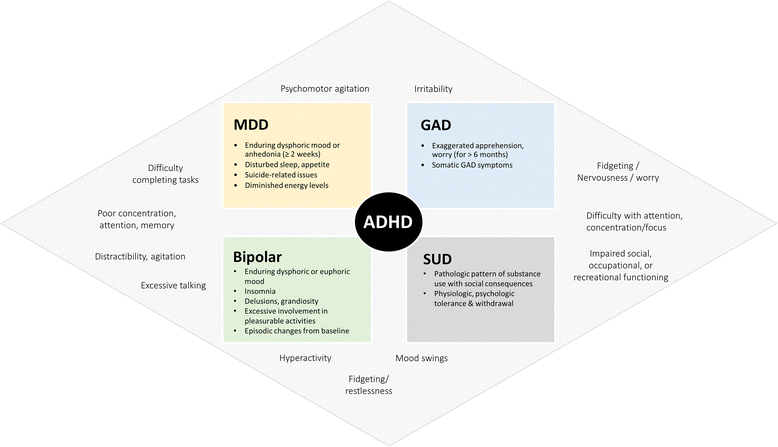Adult ADHD and comorbid disorders: clinical implications of a dimensional approach
- PMID: 28830387
- PMCID: PMC5567978
- DOI: 10.1186/s12888-017-1463-3
Adult ADHD and comorbid disorders: clinical implications of a dimensional approach
Abstract
Attention-deficit/hyperactivity disorder (ADHD) in the adult population is frequently associated with comorbid psychiatric diseases that complicate its recognition, diagnosis and management.The prevalence of ADHD in the general adult population is 2.5% and it is associated with substantial personal and individual burden. The most frequent comorbid psychopathologies include mood and anxiety disorders, substance use disorders, and personality disorders. There are strong familial links and neurobiological similarities between ADHD and the various associated psychiatric comorbidities. The overlapping symptoms between ADHD and comorbid psychopathologies represent challenges for diagnosis and treatment. Guidelines recommend that when ADHD coexists with other psychopathologies in adults, the most impairing condition should generally be treated first.Early recognition and treatment of ADHD and its comorbidities has the potential to change the trajectory of psychiatric morbidity later in life. The use of validated assessment scales and high-yield clinical questions can help identify adults with ADHD who could potentially benefit from evidence-based management strategies.
Keywords: Adult ADHD; Neurobiology; Psychiatric comorbidity.
Conflict of interest statement
Ethics approval and consent to participate
Not applicable.
Consent for publication
Not applicable.
Competing interests
Dr. Martin Katzman has received grant support, participated in advisory boards, and/or received honoraria for giving lectures from the following: Canadian Foundation for Innovation, Lotte & John Hecht Memorial Foundation, Allergan, AstraZeneca, Bedrocan, Biotics, Bristol-Myers Squibb, Eli Lilly, Genuine Health, Janssen, Lundbeck, Merck, Otsuka, Pfizer, Purdue, Shire, Sunovion and Tweed.
Dr. Timothy Bilkey has received grant support, participated in advisory boards, and/or received honoraria for giving lectures from the following: Eli Lilly, Janssen, Lundbeck and Shire.
Dr. Pratap Chokka has received grant support, participated in advisory boards, and/or received honoraria for giving lectures from the following: AstraZeneca, Bristol-Myers Squibb, Grey Nuns Hospital, Eli Lilly, Janssen, Lundbeck, Pfizer and Shire.
Dr. Angelo Fallu has acted as a speaker, sat on advisory boards, was a consultant for and/or received honoraria for giving lectures from the following: Bristol-Myers Squibb, Ironshore, Janssen, Lundbeck, Otsuka, Pfizer, Purdue, Shire, and Sunovion.
Dr. Larry Klassen has acted as a speaker, sat on advisory boards, was a consultant for and/or received honoraria for giving lectures from the following: Allergan, Ironshore, Janssen, Lundbeck, Pfizer, Purdue, Shire, and Sunovion.
Publisher’s Note
Springer Nature remains neutral with regard to jurisdictional claims in published maps and institutional affiliations.
Figures
References
-
- American Psychiatric Association. Diagnostic and statistical manual of mental disorders (4th ed.). Washington, DC: 1994.
-
- Sobanski E, Bruggemann D, Alm B, Kern S, Deschner M, Schubert T, et al. Psychiatric comorbidity and functional impairment in a clinically referred sample of adults with attention-deficit/hyperactivity disorder (ADHD) Eur Arch Psychiatry Clin Neurosci. 2007;257(7):371–377. doi: 10.1007/s00406-007-0712-8. - DOI - PubMed
Publication types
MeSH terms
LinkOut - more resources
Full Text Sources
Other Literature Sources
Medical


